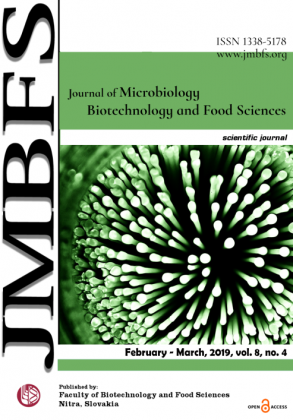LEVISTICUM OFFICINALE AND ITS EFFECTS ON BOVINE SPERMATOZOA ACTIVITY
DOI:
https://doi.org/10.15414/jmbfs.2019.8.5.1212-1216Keywords:
lovage, male gametes, motility, mitochondrial activity, bull, free radicalsAbstract
Lovage (Levisticum officinale) is a versatile medical, aromatic and spice plant of the family Apiaceae. Its extract has the ability to decrease blood pressure, to support digestion and bile secretion, to regulate irregular menstrual cycle and to act as a gentle aphrodisiac. The aim of this study was to identify major chemical components of the lovage extract followed by a comprehensive evaluation of its in vitro effects on selected quality parameters of bovine spermatozoa. Lovage extracts were subjected to high performance liquid chromatography (HPLC) which identified rutin, kaempferol, chlorogenic acid and neochlorogenic acid among the most dominant chemical components of the plant material. For the in vitro experiments, 10 ejaculates from sexually mature bulls were exposed to solutions with a gradually increasing concentration (300; 150; 75 and 37.5 μg/mL) of the extract. All analyses were performed following 0, 2, and 24 hours of in vitro culture. The motility evaluation was done using the computer-assisted sperm analysis (CASA) method, which revealed that higher concentrations of lovage extract (especially 300 μg/mL) had an immediate negative effect when compared to the control group (P<0.01), while 75 and 37.5 μg/mL had an immediate stimulating effect. The sample supplemented with 75 μg/mL extract showed a satisfactory motility even after 24 hours of incubation when compared to the rest of the samples. Cell viability is closely related to the motility, which were evaluated using the mitochondrial MTT test. Low concentrations of lovage stimulated the viability of the sperm cells while higher concentrations had an inhibitory effect (P<0.05; P<0.001). The NBT test was used to assess the superoxide radical production. The experimental data confirm the potential antioxidant effect of lower doses of lovage (P<0.05) and prooxidant properties of higher concentrations. The results generally suggest the beneficial effects of lower concentrations of the lovage extract and toxic effects of higher doses, providing a solid foundation for further research on the effects of lovage on male reproduction.Downloads
Download data is not yet available.
Downloads
Published
2019-04-01
How to Cite
Tvrdá, E., Varga, A., Slávik, M., & Ãrvay, J. (2019). LEVISTICUM OFFICINALE AND ITS EFFECTS ON BOVINE SPERMATOZOA ACTIVITY. Journal of Microbiology, Biotechnology and Food Sciences, 8(5), 1212–1216. https://doi.org/10.15414/jmbfs.2019.8.5.1212-1216
Issue
Section
Biotechnology
License
Copyright (c) 2019 Eva Tvrdá, Anikó Varga, Marek Slávik, Július Ãrvay

This work is licensed under a Creative Commons Attribution 4.0 International License.
All papers published in the Journal of Microbiology, Biotechnology and Food Sciences are published under a CC-BY licence (CC-BY 4.0). Published materials can be shared (copy and redistribute the material in any medium or format) and adapted (remix, transform, and build upon the material for any purpose, even commercially) with specifying the author(s).





